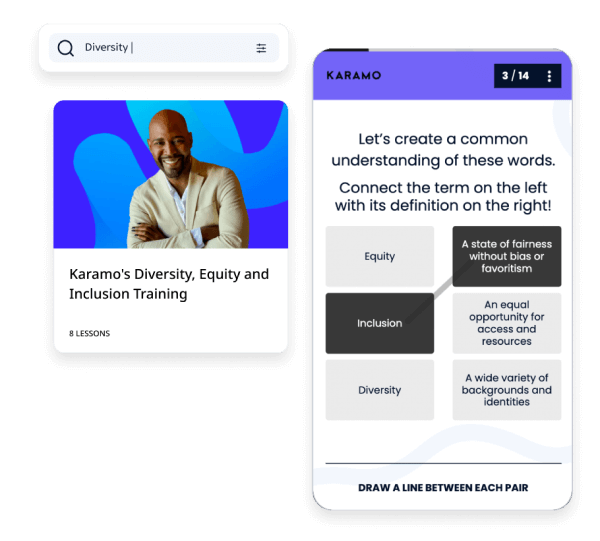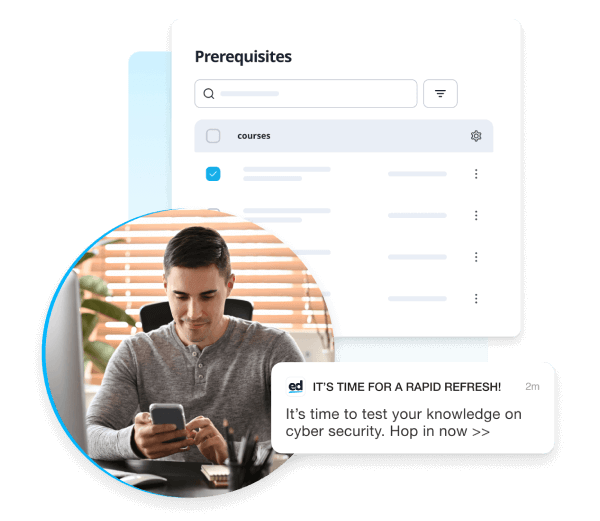10 Self Evaluation Tips for Improved Employee Performance

Self-evaluation is a great way for employees to take ownership of their growth and development by diving into their strengths and weaknesses. But it’s hard to know where to start. That’s why we’ve made a list of self evaluation tips to help you be proactive in improving at work!
1. Seek training and development programs
For our first self evaluation tip, it’s always great to head out and find training opportunities out there. Whether it’s company-mandated training or your learning content online, it’s always going to serve you in the long run no matter what. Usually, in training programs, there are knowledge checks like quizzes or hands-on projects where you’ll be tested on how much you know or don’t know about certain important topics. Through these, you can begin your self-evaluation.

Advanced learning tools like EdApp provide microlearning courses that are designed not just to deliver information but to help learners improve through quizzes and a neat feature called Rapid Refresh. Rapid Refresh is a set of quizzes assigned by a trainer to test team members’ knowledge of the course content they’ve taken. Trainers just need to set the frequency and the algorithm will take care of how often these quizzes come based on how well team members score.

Having complete data reporting from these training programs will help you self-evaluate and create a learning path you can be comfortable and challenged with. You can even customize these learning paths with your supervisors or trainers to make them even more effective.
Make self-evaluation simpler with EdApp, try it out for free!
2. Review your job description
A great self evaluation example for work is coming back to your job description. To some people, it may just be a bunch of descriptions, but it sets the parameters for your role and decides whether or not you are doing your job right. The job duties section sets concrete markers for you to hit and the job qualifications check if you have enough experience and skills for the role.

Part of self-evaluation is reviewing your objectives and understanding the expectations of your position. From there you can now decide how to improve your performance and which aspects of your job you want to prioritize. It also helps to review your company’s values and mission, to make sure you, as an employee, are continually aligned with the organization’s culture and goals.
3. Keep a record of your accomplishments
Now this is important and tied to reviewing your job description. A key part of self-evaluation and another one of the best self evaluation examples is to always keep a record of your accomplishments. It may seem vain, but accomplishments are markers of success. And by reviewing your accomplishments, you can gain perspective on your strengths at work. Accomplishments can be anything from small, simple shout-outs from coworkers to big company awards or commendations.

Celebrate these successes but also challenge yourself to push even further. A growth mindset takes these accomplishments as objective, and recognizes that they can always be improved upon. This is because having a static goal in mind can also limit you. For example, if you’re only aiming to get to a certain position in the company, you’re closing yourself to the opportunity to go beyond or even somewhere other than that position.
4. Take note of your failures
Let’s be clear. Your failures don’t dictate who you are. They dictate your weaknesses. This can be encouraging because weaknesses can be improved, and you can improve. Self-evaluation is a process that takes a look at all aspects of your work life, so putting your weaknesses into perspective can net positive results.

If you’re lacking in communication skills, take some courses on public speaking and active listening. If you need to improve your technical ability, take some time to practice. Or, if you’re failing at a key area of work, maybe it’s time to reevaluate your position. Are you really happy where you’re at in your career? This kind of self-evaluation might lead to bigger and better opportunities.
5. Seek feedback
Don’t wait for feedback and don’t wait for your boss to call you into their office. Seek it, and constantly embrace it. This is also a great self evaluation example for leadership because your team will always be available and more often than not willing to provide feedback. If you’re not the confrontational type, make use of surveys, polls, or social learning tools to foster a work environment that thrives in feedback.

There will be times when feedback will sting, so you’ll need to mentally prepare for that. Just remember that feedback is ultimately for your improvement and growth. In the long run, it’s also for your organization and everyone around you.
6. Set realistic goals
Now here’s a more practical tip: Assess your goals and do this regularly. Start by evaluating your work capacity. Take note of your strengths, weaknesses, and challenges. Now after considering all of these points, prepare achievable goals. This will set you up for success because you’re going to avoid overwhelming and overextending yourself.

If you’re in a leadership role or work within a team, it’s best to set goals together through alignment meetings and 1-on-1s. This way there’s also time to provide feedback and brainstorm ideas for improvement. Goals can be simple and numerical, but they can also dive deeper into more qualitative options. Instead of “I want to hit at least 5 deliverables per day” go for “I want to create a more productive work environment so I can hit more targets per day.”
7. Create an action plan
Most of the self evaluation tips we’ve elaborated on are more like data-gathering tasks. After gathering all your information, it’s time to build an action plan that works for you. In the process of creating a plan, you’ll be able to see the bigger picture of your evaluation because you’ll be applying this information to actionable steps.

Creating an action plan includes a realistic time frame. Aim for concrete goals within specific time frames. They don’t need to be on the dot but it’s helpful to segment plans into quarters in a year, so there’s time for evaluation.
8. Use productivity tools
Take advantage of technology! There are a lot of automation and productivity tools that can help you with self-evaluation. Learning management tools like EdApp can help with managing your training goals. Spreadsheets can make record-keeping much easier, and applications like Officevibe can make work feedback much more efficient.

9. Build positive work relationships
Related to the feedback self evaluation tip, it should be a priority to create lasting positive work relationships. Your work performance doesn’t just affect your company, it directly affects your co-workers, making them the primary source of feedback and growth. By fostering healthy work relationships you find out key areas of improvement that you would otherwise not have realized or discovered.

Building relationships outside of your coworkers, with clients and customers for example also opens new doors for self-evaluation. How you are with clients, customers, and suppliers may be completely different, so always consider that when self-evaluating.
10. Fuel your curiosity
This may seem vague, but one of the most important self evaluation tips you can take away from this article is to always fuel your curiosity. This means you need to stay hungry for growth but also open yourself to discoveries about yourself. Open yourself up to different tasks or skills that you might not have tackled before. Ask about things at work, and ask about how you can help. Self-evaluation always begins with a question, and our tip is to never stop asking.

Author
Alec Bailon
Alec is an eLearning expert for EdApp, a pioneer LMS that designs creative mobile workplace training solutions. On the off days, they enjoy cooking, reading, or finding a live show or play to watch.
